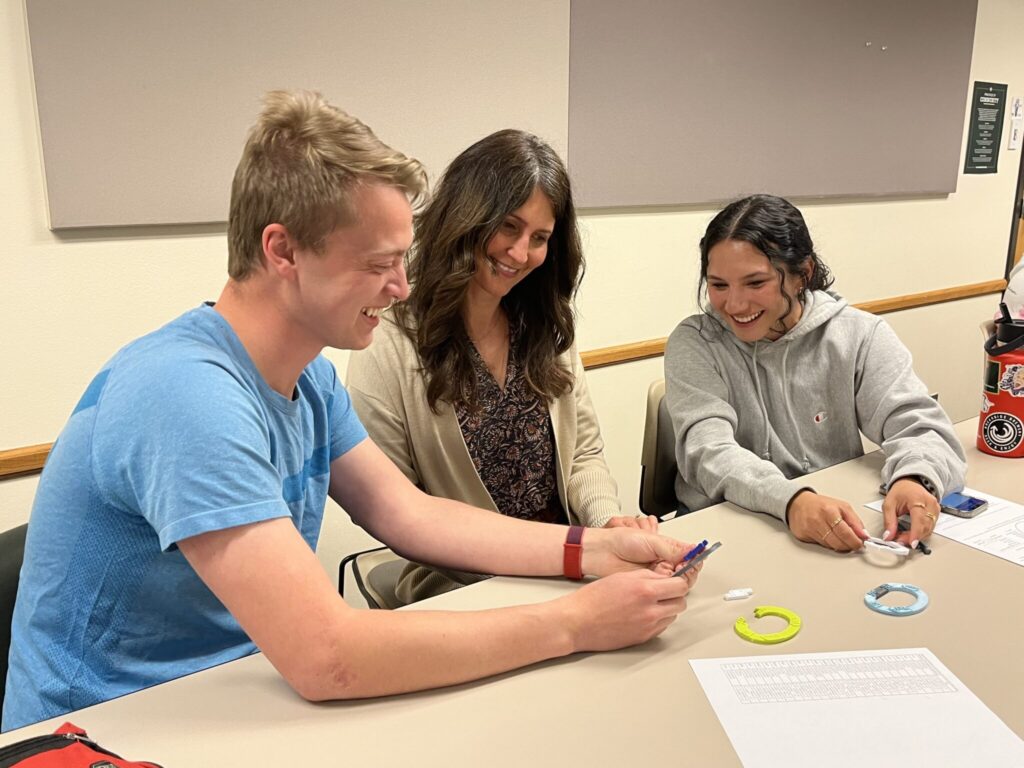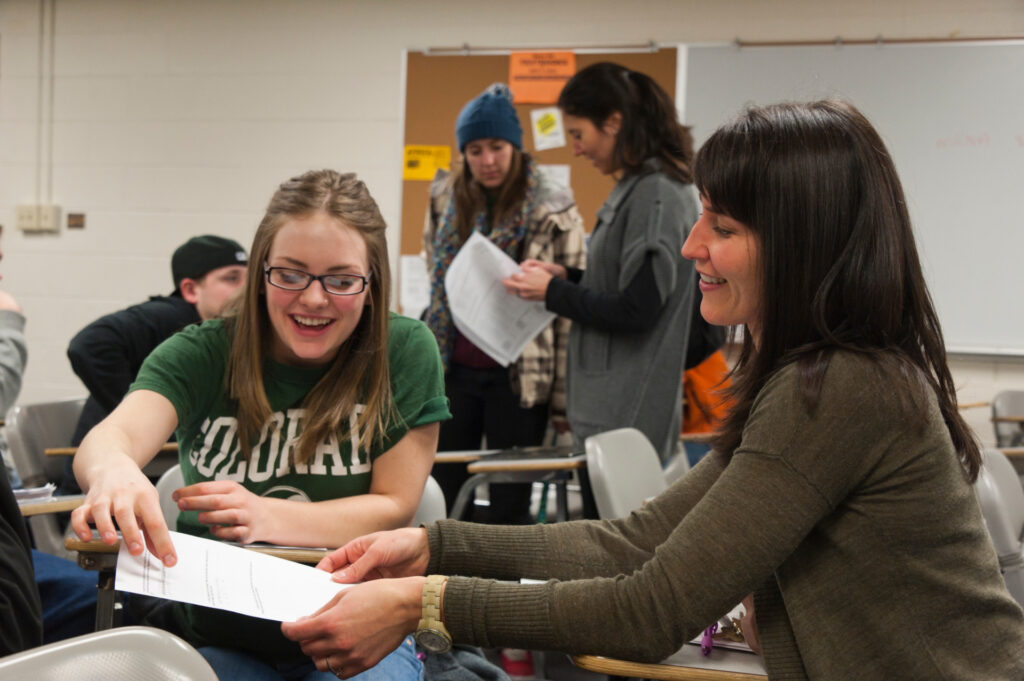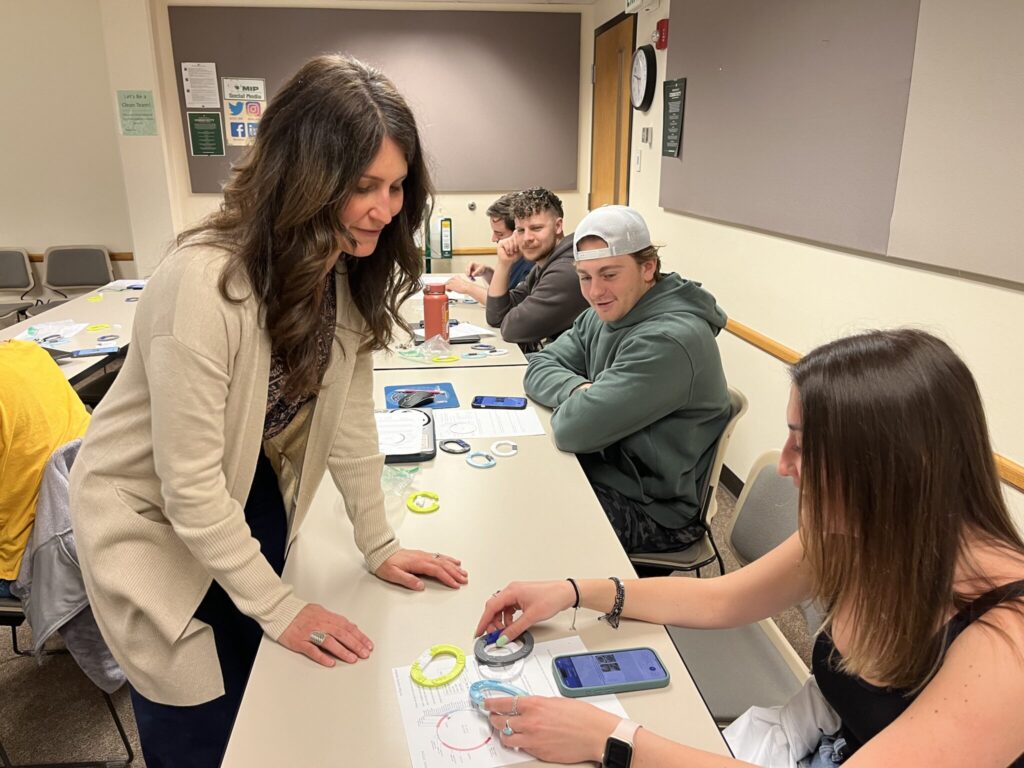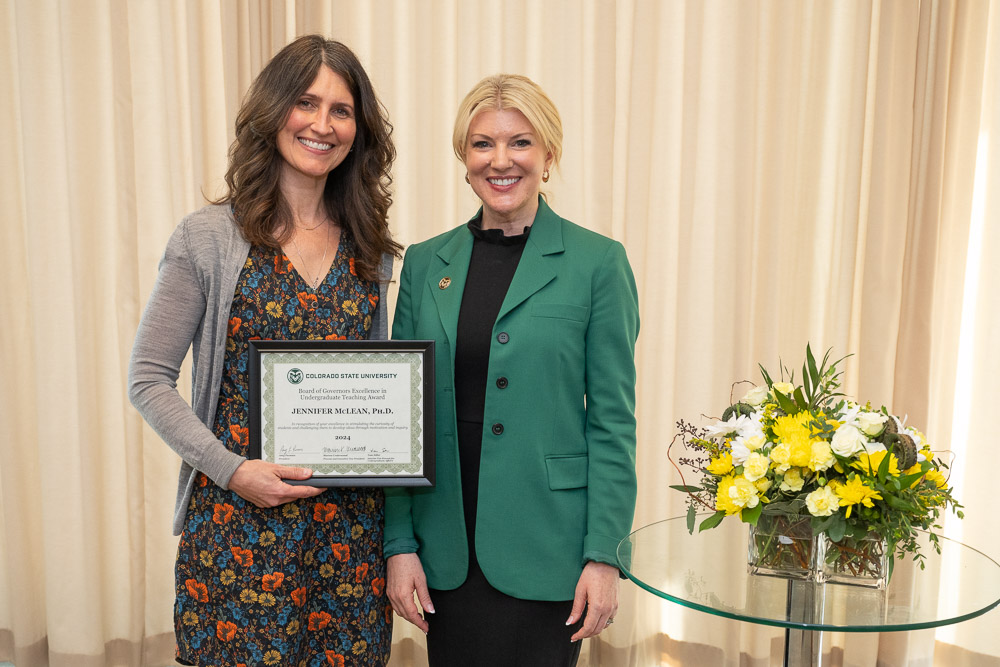
Jennifer McLean, Ph.D., an associate professor in the Department of Microbiology, Immunology, and Pathology, was named the recipient of the 2024 Board of Governors Excellence in Undergraduate Teaching Award earlier this month.
“I genuinely love my career in teaching in part because it combines two things I enjoy most: science and creativity,” said McLean, “The creative side of me deeply enjoys creating fun and inclusive learning experiences for all my students, and the scientist in me loves the challenge of investigating the efficacy of these new strategies in the rapidly growing field of discipline-based education research (DBER).”
McLean completed her Microbiology PhD at Colorado State University and spent several years as a postdoctoral fellow in the CSU Mycobacteria Research Labs before accepting a primarily teaching faculty position in the same department.
“I also love sharing the exciting and ever-changing world of microbes and immunity and look forward every day to teaching future scientists and professionals how microbiology and immunology shape the health of people, animals and the planet,” McLean said.
Applying this love of science and drive for creativity to every aspect of her career has led McLean to impactful teaching, educational innovations, valuable leadership, and mentorship.
By her own count, McLean has taught about 7,827 students – a “humbling” number – since 2007.
Actively learning microbiology
As an educator, “I have made it my mission to move away from solely lecturing in my large enrollment courses and instead continue integrating active learning methodologies backed by research and shown to be effective,” McLean said.
She was an early adopter of screen capture to record her lectures, and real-time annotations on lecture outline, for students to refer to later. A 10-semester long study by McLean and her mentor, University Distinguished Professor Erica Suchman, did not find the practice discouraged class attendance but provided a beneficial study tool. The practice spread to other MIP courses and earned her the Preston Davis Instructional Innovation award at CSU in 2011.

Joining the MIP300 General Microbiology team provided a fruitful environment for McLean to apply educational science and creativity in the classroom.
MIP300 is offered each year through nine sections of 80 to 100 students, by three instructors who collaborate to provide a consistent experience across classrooms. McLean personally strives to learn the names of and build relationships with all her students each semester through interactive classes and office hours.
“As an anatomy and physiology student with little to no interest in microbiology, I was not looking forward to the renowned to-be-challenging course. Despite my initial trepidation, I found myself looking forward to class… telling my friends about my learnings, energized and excited by the subjects of the course,” said Megan Hager, “This change of heart was entirely due to the exceptional professorship of Dr. McLean.”
MIP300 is foundational for Microbiology and Infectious Disease concentration students, but also a required, and elective, course for multiple other majors on campus including Animal Sciences, Biology, and Fermentation Science and Technology. Many students, focused on professional school, take this course to fulfill their microbiology prerequisites.
Flipping the script
“I use backwards design when developing new class activities, first identifying topics my students struggle with most and then asking myself, ’What do I want students to be able to do in the end?’ Focusing on the active nature of this question helps me write measurable learning outcomes and to create meaningful learning experiences that align with those learning outcomes,” McLean said.
She developed and implemented eight flipped classroom activities where students learn new concepts prior to class, conduct a pre-flip quiz to measure their initial understanding, and then complete an active learning activity in class to practice the concepts in a supported learning environment.
In 2016, one of McLean’s flipped activities was featured nationally by the American Society for Microbiology (ASM) Education Blog through the White House Office of Technology in honor of Active Learning Day. Backed by research, these activities now include 3D printed and magnetic models, concept mapping, and sequence strips in MIP300.
iClicker questions incorporated throughout the hands-on activities provide students instant feedback as they practice these complex concepts. They now have a vetted question bank across sections of higher-level Bloom’s Taxonomy questions.
“The prepared activities strengthened my learning by challenging me to think about the process and not just the answer,” wrote Biology major Karissa Ciaccio, whose microbiology interest and minor was sparked in class, for McLean’s nomination, “I had a significantly better understanding of the mechanisms that were introduced, and I felt more confident in MIP300 than any other course.”
Best practices yield better grades
McLean also brought Retrieval Practice Activities (RPAs) into MIP300 through participation in the CSU pilot by education professor James Folkestad of the U-Behavior system, a method to promote optimal students study behaviors and practices with course content. Initial results from multiple semesters demonstrate a full-letter grade improvement on exams and implementation in additional CSU courses will investigate long-term studying changes and learning benefits.
“General Microbiology is not like any class I have ever experienced before. The class includes flipped lectures, [RPAs], group exams, and reflections on just about everything we do, so the class can continue to evolve into something better,” said Briana Henry. “Most beneficial was the retrieval practice activities; she explained and showed us the research behind the RPAs to help us understand what they do for our learning.”

As a large-enrollment course, students’ learning in the classroom is further supported by Undergraduate Learning Assistant (ULA) peers. McLean has refined the MIP300 ULA model to provide a rich and rewarding experience for a group of 20-25 returning students each semester. Through MIP384 Supervised College Teaching, the ULAs prepare to lead students through the same the same active learning activities and strategies they initially experienced.
These best practices have received praise from countless MIP300 and MIP384 students. They find McLean an active, kind, patient instructor with an evident passion for microbiology, their long-term success, and the continuous innovation and improvement of her teaching methods.
Transferring her active learning methodology to an online medium provided the next challenge for her scientific and creative approach to teaching innovation. Weekly “Hello from Dr. McLean” video announcements, short lecture videos, modified group work, and specialized software to recreate physical into eLearning activities have been the start of this evolution.
She continues to offer one hybrid and one fully remote section of MIP300 since resuming in-person instruction. Ongoing data analysis of online student performance has highlighted new education research questions for McLean to investigate and implement through her teaching practices.
A role model & mentor
“Dr. McLean’s unwavering commitment to her students and colleagues is truly inspiring,” shared fellow MIP300 instructor and faculty Katriana Popichak, who herself was taught by McLean when she was an undergraduate microbiology student. “More than anything, she listens attentively and wholeheartedly supports our passions, fostering a community of aspiring teachers, scientists, and eternal learners.”
Since 2018, McLean has served as the Associate Department Head for Undergraduate Education, leading the team of teaching faculty and staff who shape the undergraduate microbiology program.
“She fosters a culture of excellence in the department’s teaching faculty and begins by demonstrating it herself,” Suchman said.
McLean has participated in numerous professional opportunities around undergraduate education, instruction, and innovation at the university and through multiple professional societies. To foster instructional innovation in the next generation, she encourages the pursuit of professional development and funding opportunities to bring their ideas to life in the classroom.
She continuously improves herself through peer observations of her teaching performance, implementing their feedback in the classroom moving forward. These reviews are also available to other instructors from faculty volunteers in the department led by McLean.
McLean also established a monthly MIP Teachers’ Lounge, which provides a community for any instructors in veterinary medicine and biomedical sciences to develop and further their teaching knowledge. During the pandemic, McLean dedicated herself to supporting her teaching team and adapting their instruction through professional development and resources.
Through these experiences, McLean engaged with the emerging DBER field early, which has led her to recruit and develop DBER experts and practices into the department’s teaching mission. The Program for Research in Immunology and Microbiology Education (PRIME) group was recently established.
“Jenny is the epitome of everything we hope that teaching faculty will become, with broad positive impact on thousands of students both through her individual didactic teaching and mentoring, but also through her outstanding leadership of undergraduate education in MIP,” wrote department head Naomi Ward for McLean’s nomination.
